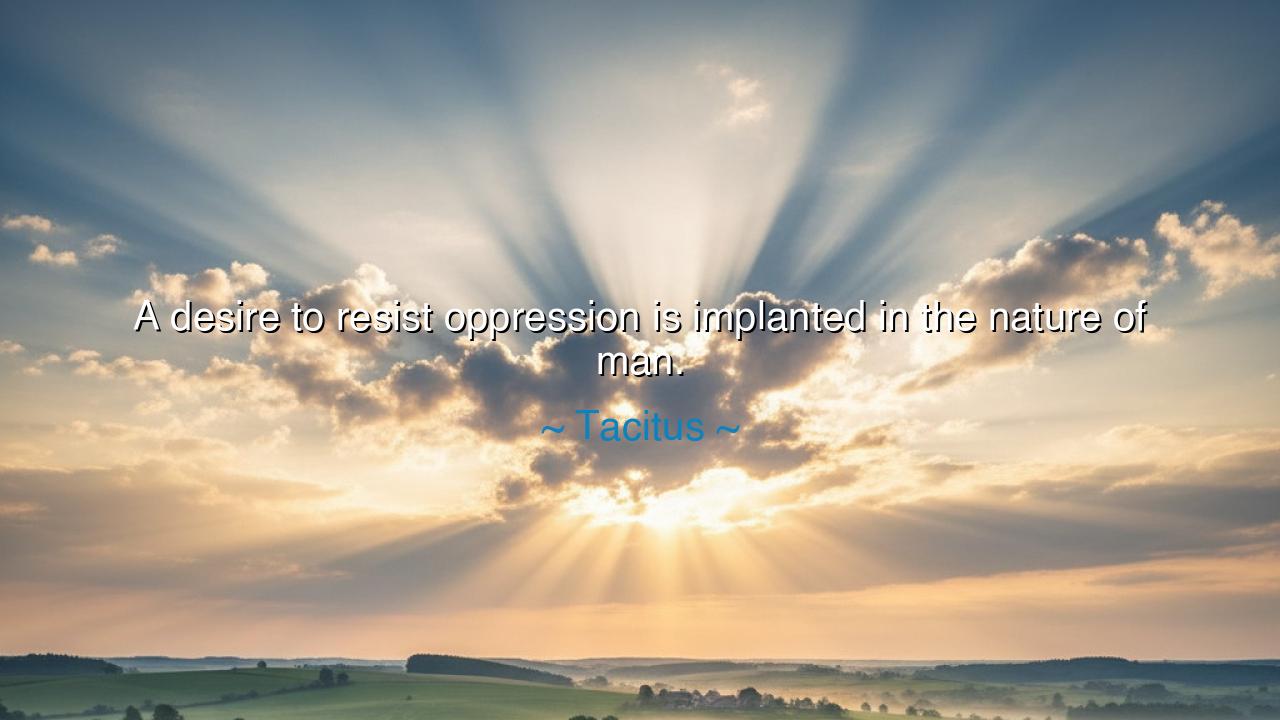
A desire to resist oppression is implanted in the nature of man.






Tacitus, the Roman historian whose pen carved the truth of empires into the stone of memory, declared: “A desire to resist oppression is implanted in the nature of man.” These words are not merely a reflection of his age but an eternal law written upon the human spirit. For though kings may claim divine right and tyrants may chain the body, yet the soul, born of freedom, revolts against its shackles. The cry for liberty is no passing fashion, no fleeting passion of the crowd; it is an instinct, older than law, deeper than culture, planted by the very hand of nature.
The origin of this declaration lies in Tacitus’ meditation on the fall of republics and the rise of despots. He had seen Rome, once the proud mother of freedom, bow before the will of Caesars who cloaked power in the name of empire. He watched as senators became flatterers, soldiers became tools, and citizens became subjects. Yet even in such a climate of submission, rebellion smoldered. Tacitus understood: you may crush resistance with armies, drown it in blood, or silence it with fear, but you cannot uproot the seed of liberty that lives in the breast of man.
History echoes with this truth. Consider the American Revolution, where farmers, merchants, and blacksmiths stood against the mightiest empire of their age. They were outnumbered, outgunned, and ill-prepared. Yet their desire to resist oppression, their refusal to be ruled without voice or justice, burned fiercer than the fire of Britain’s cannons. From Lexington’s green to Yorktown’s field, that implanted yearning guided them to victory. It was not only strategy or chance that triumphed, but the eternal law Tacitus spoke of — that man will not forever bow his neck to tyranny.
Nor is this desire confined to nations alone. Recall the march of Gandhi, small and frail, leading millions with no weapon but resolve. The salt of the earth became the symbol of freedom, and an empire trembled before the steady resistance of those it sought to crush. No decree, no whip, no prison could extinguish the natural hunger for freedom. And so the mighty British crown, upon which the sun never set, was compelled to withdraw. Here again Tacitus was proven right: freedom is not granted by rulers; it is claimed by the people, for it is rooted in their very being.
The lesson is plain: never mistake submission for contentment. When men and women appear silent under oppression, their silence is not acceptance but the gathering of strength. When they bow, it is not worship but endurance, waiting for the hour to rise. As the lion crouches before the spring, so the oppressed seem still before they leap into revolt. He who governs unjustly should tremble, for he wars not against a faction or a class, but against human nature itself.
What, then, must we practice? First, let us honor the freedom in our own lives — never surrendering our conscience to convenience, nor our dignity to fear. Second, let us defend the liberty of others, remembering that an injury to one is an injury to all. And third, let us cultivate the courage to resist injustice wherever it appears, whether in the marketplace, the household, or the halls of power. The resistance Tacitus speaks of is not only for great revolutions but for the daily defense of what is just and right.
Therefore, O children of time, remember this ancient decree: the desire to resist oppression is no mere choice but a sacred fire within every soul. It may flicker under cruelty, but it never dies. Nurture it, protect it, and wield it for the sake of yourself and others. For so long as man breathes, the cry of liberty will not be silenced. And to live in harmony with this truth is not only wisdom, but the very perfection of humanity.






AAdministratorAdministrator
Welcome, honored guests. Please leave a comment, we will respond soon